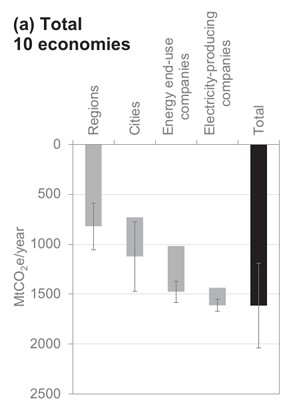This article quantifies the net aggregate impact in 2030 of commitments by individual non-state and subnational actors (e.g. regions, cities and businesses, collectively referred to as ‘NSAs’) to reduce greenhouse gas (GHG) emissions. The analysis was conducted for NSAs operating within ten major emitting economies that together accounted for roughly two-thirds of global GHG emissions in 2016. Our assessment includes 79 regions (e.g. subnational states and provinces), approximately 6,000 cities, and nearly 1,600 companies with a net emissions coverage of 8.1 GtCO2e/year, or a quarter of the ten economies’ total GHG emissions in 2016. The analysis reflects a proposed methodology to aggregate commitments from different subnational (i.e. regional and city government) and non-state (i.e. business) actors, accounting for overlaps.
Main findings:
If individual commitments by NSAs in the ten high-emitting economies studied are fully implemented and do not change the pace of action elsewhere, projected GHG emissions in 2030 for the ten economies would be 1.2–2.0 GtCO2e/year or 3.8%–5.5% lower compared to scenario projections for current national policies (31.6–36.8 GtCO2e/year). On a country level, we find that the full implementation of these individual commitments alone could result in the European Union and Japan overachieving their nationally determined contributions (NDCs), while India could further overachieve its unconditional NDC target. In the United States, where the national government has rolled back climate policies, NSAs could become a potential driving force for climate action.
Key policy insights:
- Full implementation of reported and quantifiable individual commitments by regions, cities and businesses (NSAs) in ten major economies could reduce emissions by 3.8%–5.5% in 2030 below current national policies scenario projections.
- National governments’ mitigation targets could be more ambitious if they would take NSA commitments into account. With full implementation of such action, the European Union and Japan would overachieve their NDC targets. For the United States such action could help meeting its original 2025 NDC target in spite of rollbacks in national climate policies.
- The full universe of NSA climate action expands far beyond the subset of commitments analysed in this study; NSAs could become a strong driving force for enhanced action towards the Paris climate goals.





